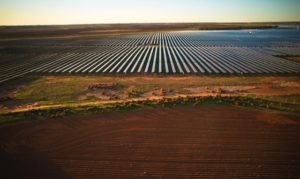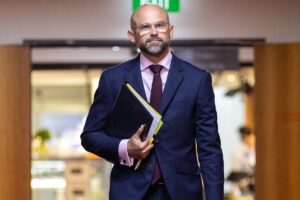Atlassian co-founder and cleantech investor Mike Cannon-Brookes has issued a new plea to governments and investors to not to underestimate the rapid pace of technology advancement in the clean energy sector, citing the Tesla big battery in South Australia as an example.
Cannon-Brookes was speaking on a panel as part of the Global Smart Energy Summit held on Wednesday and was joined by comedian and climate activist Dan Ilic and television presenter and electric vehicle enthusiast Osher Günsberg.
Cannon-Brookes told the panel that Australia wasn’t yet taking full advantage of the opportunities being created in the clean energy sector and that there is an opportunity for Australia not just to use clean energy to reduce its own emissions, but also to pivot export industries to new forms of energy.
“Long ago now, I was all about 200 per cent renewables,” Cannon-Brookes told the panel. “Because literally it was a thing that makes people think. ‘What do you mean 200 per cent?’”
“It’s because this is an opportunity for us, we’ve never been able to have more energy than we need, until you think about it and go, actually, what we do it export energy. When we talk about fossil fuels, we are exporting energy. All we’re saying is we revolve that to export a different type of energy. That’s an opportunity for us.”
Cannon-Brookes added that he was confident that technologies like solar, wind and battery storage would be able to continue achieving rapid improvements in cost and performance, as their nature as ‘modular technologies’ would allow for continued improvements in design and production.
“Solar panels, batteries, wind turbines, these are modular technologies. By that I mean, if I have one panel or a million panels, I just make more of the same thing. Right? It’s why chips get cheaper is because we make slightly better [computer] chips and we make bigger factories that make more chips,” Cannon-Brookes said.
“These are modular technologies, they will always win once they reach the point of scale that begets the learning rate which makes them cheaper, which means that they get more scale which means that they get more learning rate.
“We’ve seen this in chips. We’ve seen it in cameras. The camera in your mobile phone in ten years, improved quality per pixels per dollar a thousand-fold. So it got either 1,000 times cheaper, or it got 100 times cheaper and ten times more powerful or some combination. This is the way that technology works when that technology is modular.”
“I’ve had discussions with politicians where I say ‘do you realize that batteries have gotten like ten times cheaper or three times longer lasting or twice as light? Or any of these sort of facts?’ And they say ‘but you don’t know that will happen next year?’ And I’m like, ‘ah, but I do’.”
“I can’t tell you in the next three months, but I can tell you if I look forward two, three, four years, that will absolutely continue.”
Cannon-Brookes pointed to his own experience as one of the instigators of what would eventually become the Hornsdale Power Reserve, aka the Tesla big battery – through a twitter conversation with Tesla CEO Elon Musk, as an example of how quickly things can change with energy technologies.
“The reason I think that was such an amazing event is rarely have we had a lot of people shit on an idea, then the idea gets built, and then the idea gets proven, in such a short period of time. That entire cycle was 12 months.”
Following the successful deployment of the Hornsdale big battery, which saw Elon Musk deliver on a bet made with Cannon-Brookes over Twitter, the Atlassian co-founder has set sites on an even bigger deployment clean energy technology, as a leading backer of the proposed $20 billion Sun Cable project, that is seeking to export solar power to Singapore.
Osher Günsberg told the panel that he believes that many of the opinions about clean energy and climate change are driven by emotions, but the falling costs of clean energy technologies were working to counteract this.
“I agree with the idea of pushing people to understand that the financial decision is the right decision, right now,” Günsberg said. “But the emotional decision, that’s the thing that people react to. That’s the people who go ‘but I saw a thing on Facebook’. If it’s an emotional decision, people want to shut it down and reject it. But if it’s a financial decision, people go, Oh, ‘hang on what? I can save money?’ That’s the way in.”










